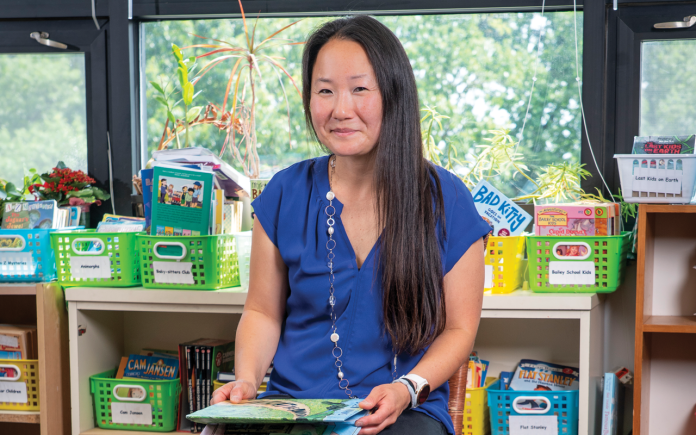Amanda Morey
Second Grade Teacher
Mt. Daniel Elementary School
Years teaching: 15
Morey has spent her entire public education career at Falls Church City Public Schools. She was nominated for the Falls Church Education Foundation’s Teacher of the Year award in 2020, 2023 and 2025.
- I’m from a family of teachers. I got a master’s in education from the College of Saint Rose, but I didn’t become a teacher right away. I thought I was going to go into politics, so I worked at a law firm and then a trade association, but I wasn’t satisfied being in an office.
- Second grade is a sweet spot. Students love school and they’re eager to learn. They’re more independent and receptive to humor. I see a lot of growth in their reading, writing and math. It’s when that transition happens from learning to read to reading to learn. It’s rewarding to witness all their academic and personal growth.
- I strive to be the teacher I would want my own kids to have. One of the most important things is to build trust and a relationship with your students. It takes time to learn about them, their family, their culture, their favorites or dislikes. I have morning meetings every day when students can share. I believe each child has unique experiences and strengths. It’s my responsibility to create a community that’s welcoming and inclusive and where everyone has a space to learn and feel valued.
- You’ve got to be humble and OK making mistakes. One time, an abnormally large fly was buzzing around the classroom and distracting all the kids. I knew that to get them back on track, I’d have to get rid of it. The class wanted me to save it. I tried to capture it with a cup and ended up falling flat on my face. It was such a moment, but I did end up catching and releasing it.
- I want families to know where their kids are socially and academically, and how they can connect at home. Some parents can’t go to PTA meetings or chaperone a field trip, and that’s OK. Communicating about what’s going on at school is important. When a student knows their teacher and their families are on the same page, it makes it a better classroom environment. Some families send me holiday cards. One mom with a high schooler and a high school grad still sends me a basket for Teacher Appreciation Week. It’s amazing. —Interview by Stephanie Kanowitz
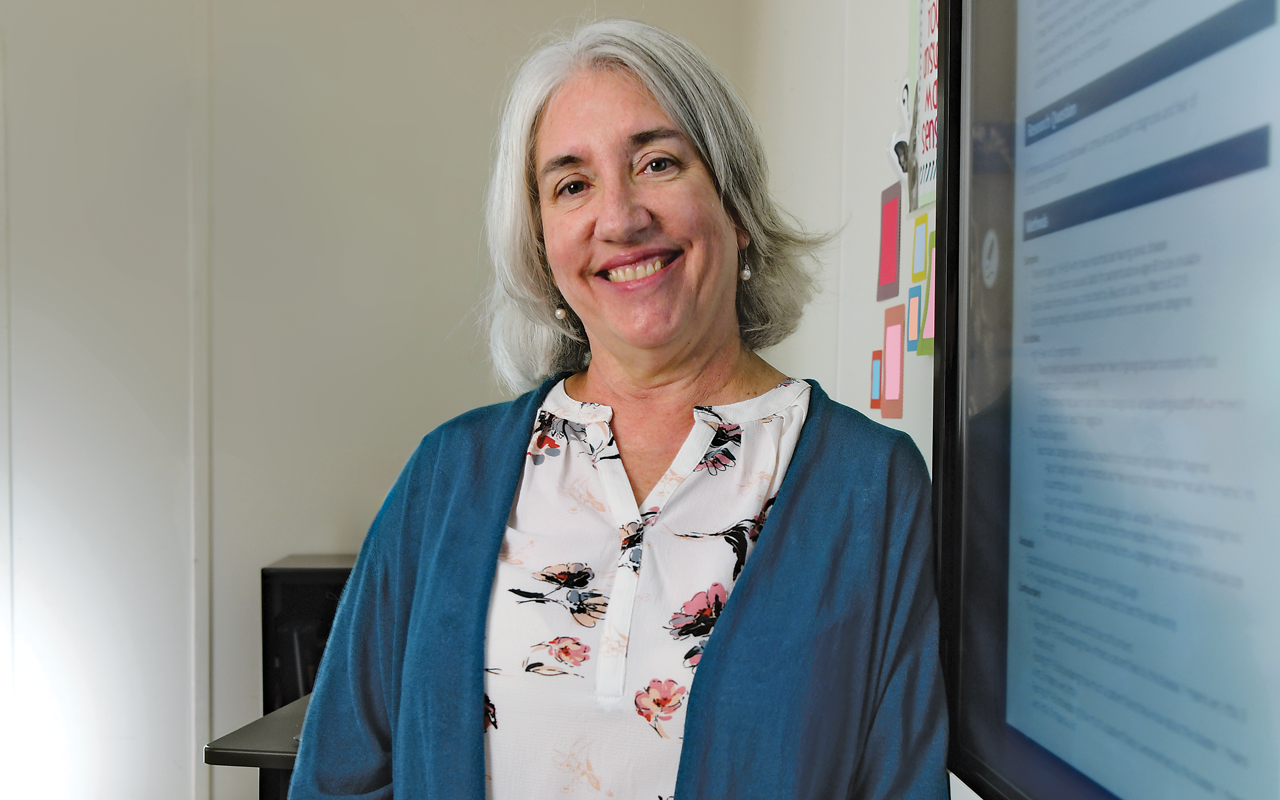
Gerri Maskelony
Math, Statistics and Music Appreciation
Arlington Tech
Years teaching: 10
With master’s degrees in applied statistics and music, Maskelony teaches college-level statistics, quantitative analysis and music appreciation courses. In January, she was one of only 330 teachers nationwide to receive the National Science Foundation’s Presidential Award for Excellence in Mathematics and Science Teaching. She also received a Fulbright Teacher Exchange award to conduct research in Singapore during the spring 2025 semester.
- I’m a career-switcher. I previously worked as a statistician in operations research. When my youngest child started kindergarten, I wanted to get on the school schedule, so I took a job as a testing coordinator. I really enjoyed the community of the school setting, so I got certified. At first I was teaching English learners. Then I taught guitar. I started teaching math classes on the side, and things blossomed from there.
- I love teaching because, unlike with other jobs, you can reinvent yourself every year. You create your own ecosystem within a set of parameters. We’re in a project-based setting, so I can guide students through independent research that allows them to demonstrate mastery of the academic concepts outside of a didactic model. It stokes their enthusiasm and their excitement for the topic when they have that agency.
- Students have a lot of youthful enthusiasm about wanting to change the world, and I love that about them. But I also know that if you don’t have the data, math, communication and analytical skills to back it up, you’re not nearly as effective as you could be. My vision is to pair their enthusiasm for life with an understanding of how to read other people’s data and how to find and generate their own data and analysis. Then they’ll be really powerful.
- Last year, the State Educational Technology Directors Association invited four of my students to present on a panel. It was the most professional panel I’ve seen at any conference. They were asking APS not to restrict them from using education technology and describing how they get around Lightspeed Systems, which APS uses to manage edtech use on school-issued devices. Guess who was attending the conference? Lightspeed. “Mr. Lightspeed” came up and offered them paid internships.
- My music appreciation class is a great conceptual break for students. They’re looking at the building blocks of music, how sound is organized, the basic mechanics of different instruments and music history. One of the projects they do is called “The Power of Music in Film.” We download silent films from the Library of Congress, and they score them. They have to have transitions and sound events and two different moods, such as ominous and scary or beautiful and upbeat. They learn how powerful music is in creating that emotional environment for us when we’re watching a film or just living life. —Interview by Stephanie Kanowitz
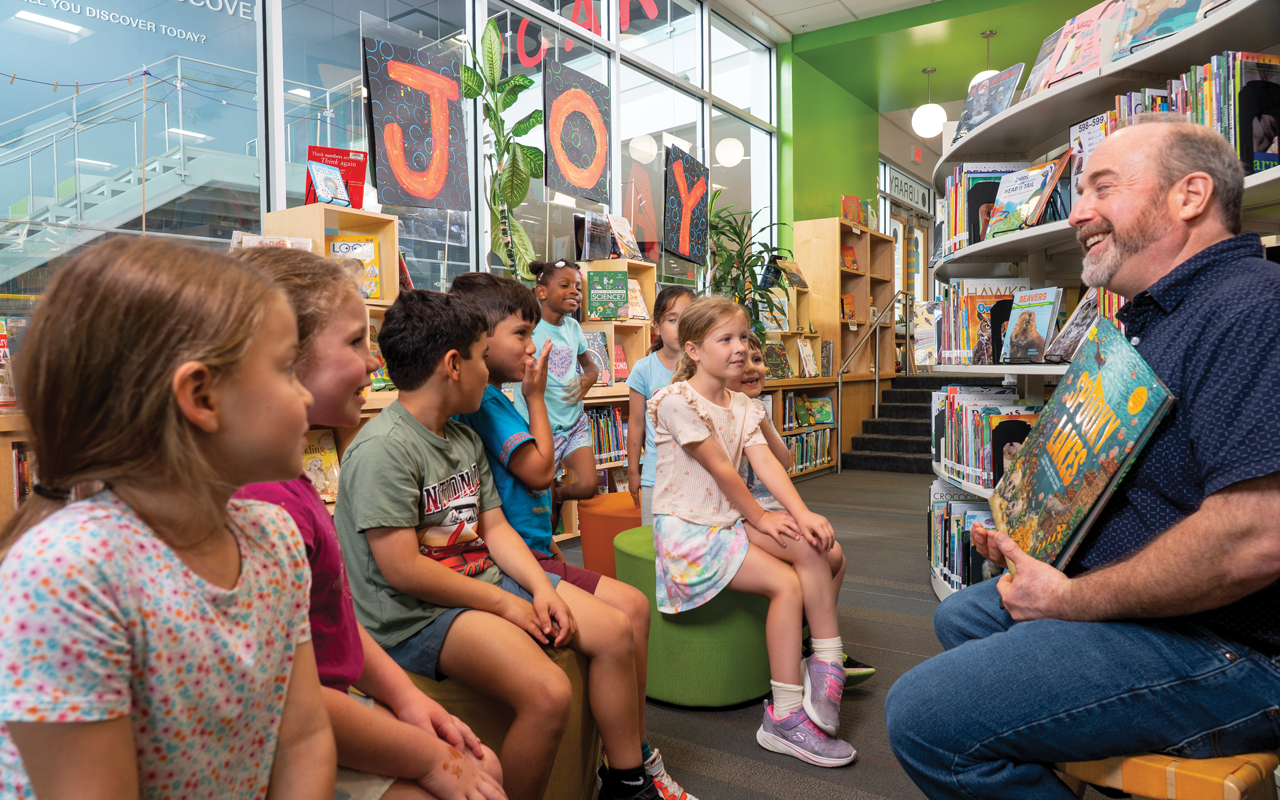
John Re
Library Media Specialist
Discovery Elementary School
Years teaching: 28
A resident of Douglas Park, Re spent a decade teaching fourth through sixth grades before combining his passions into a new role as librarian. He was named Discovery’s Teacher of the Year for 2024-25 and plans to retire after the 2025-26 school year.
- As a classroom teacher, I did a lot with language arts, reading and writing, so becoming a librarian seemed like a natural fit. Being a classroom teacher first was a huge benefit. You understand where the other teachers are coming from and what support they need.
- As a librarian, I want to cultivate a spark—an interest in something new. I often start my class with a short video about an artist or something cool in nature to inspire students to explore a section of the library they maybe haven’t been to. I do lunchtime book clubs, picking books that are going to expose them to a different culture or situation. With sports, you need cross-training. You need to run or swim to help with your soccer. It’s the same thing with books.
- When a parent says, “My kid’s not reading,” I say, “Maybe they haven’t found the right book. Let me have a one-on-one with them.” I’ll give them three books and say, “If those three books don’t work for you, that’s all right. Come back and we’ll try three more.” Maybe they need a little handholding. Maybe you have to read the first two chapters together to ignite that spark and they get passionate. When you see kids light up and you know they’ve found the right book, that builds their reading confidence. It’s those moments when they come back excited about something they’ve discovered.
- We live in interesting times. Technology is exciting, but as with everything, you need a little curation. We’ve piloted a couple of AI projects. In one, we used MagicSchool AI, an education-centric platform, to create a chatbot that answered fifth graders’ questions about the Renaissance. I think AI is also going to help teachers with prepping. For instance, I asked ChatGPT to give me some prompts for a reflective activity in which I ask fifth graders what advice they would give to students in younger grades. It was nice to have suggestions I could tweak and finesse. It’s that whole curation and guidance, which is what libraries have always done.
- I try to make this a low-stress library. When students come in, we have a mindful breath moment to get them connected and centered. I let them pick their own seats. I give them the power to take ownership for their learning and their behavior.
- My mantra is: Be brave, be curious and be kind. —Interview by Stephanie Kanowitz
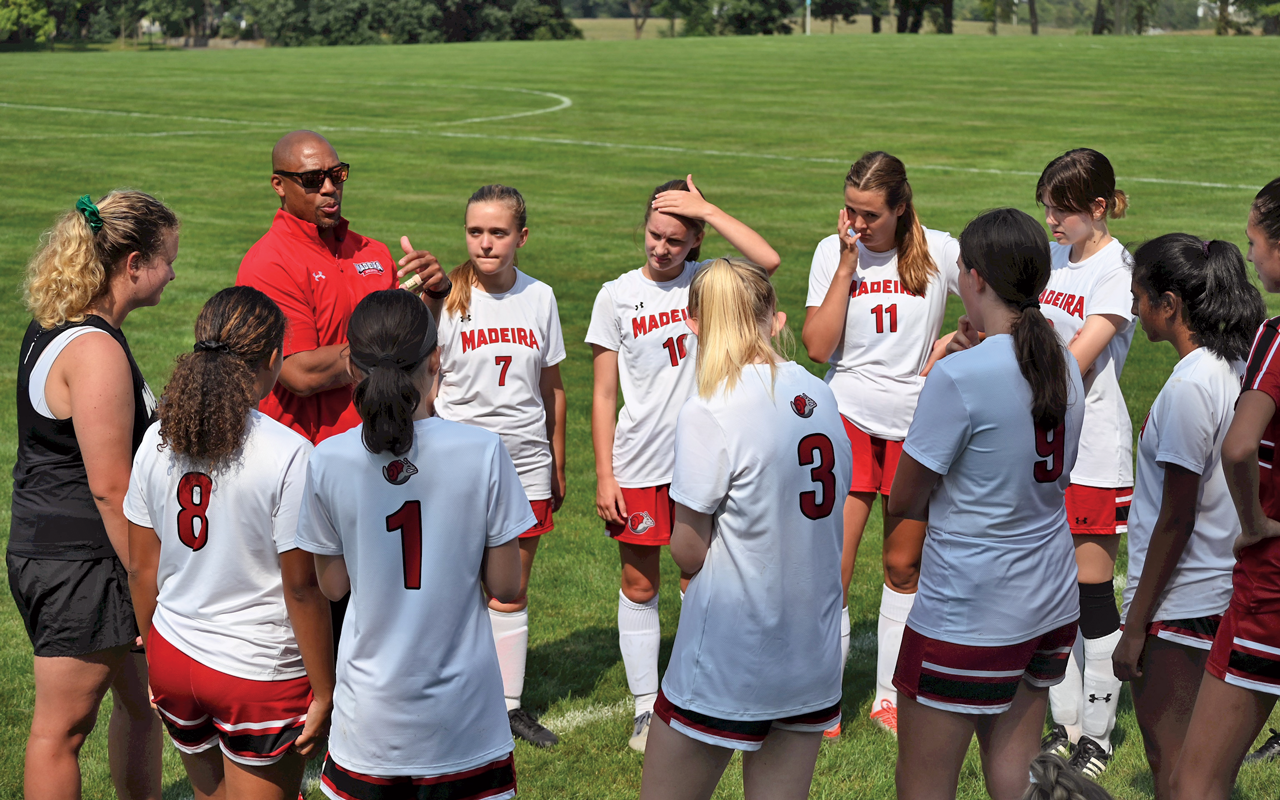
Tavis Laws
Director of Athletics
The Madeira School
Years Teaching: 15
A former professional athlete (he played arena football for the Reading Express), Laws has spent nearly two decades as an athletic administrator, including seven years at Congressional School in Falls Church. In addition to his work at Madeira, he runs the Laws Elite Basketball Academy.
- No day is the same. As an athletic administrator, you can be in the weeds helping run a practice or a conditioning session, or you can be at the 30,000-foot level, where you’re strategically thinking about next steps.
- What motivates me? The kids. Knowing they’re gonna show up, regardless of what you have going on in your world. They’re going to be bright-eyed, with so much energy. They look to you to be that space where they can just release everything, whether it’s a conversation or just letting go of academic pressure and the conflicts of the day. They’re looking to you as their leader to make it a successful, happy, enjoyable experience.
- I love what I do. This is what I was put on earth to do: to really embrace and encourage athletes and coaches to do their personal best each and every day.
- I view athletics as a classroom—it just looks different. We don’t have desks, pencils or pens, but there are definitely lifelong lessons you can learn from athletics that you cannot learn in any other aspect of the educational process.
- The secret sauce is don’t ever degrade. Don’t ever raise your tone. Talk to them if they make a mistake: “I don’t care that you made a mistake. Get back out there.” It’s how you respond. That is the best way to truly get people to trust you, including athletes and coaches.
- Everyone needs to feel great about themselves, but be held accountable at the same time. I think I’ve done well maintaining that equal balance of push-pull—knowing when to push an athlete or coach, knowing when to pull back, knowing when they’re at a low moment, what they need at that time, because it is an art. Being an educator is an art.
- Just because someone fails doesn’t mean they are a failure. It means they’re growing. That’s what education is about. It’s about failing at something, recalculating, recalibrating and then finding a new way, or re-strategizing and moving forward. This notion has been lost a little bit—the fact that people don’t want their child to be in any discomfort. In most cases, failure is a positive thing. As long as there’s no harm done, failure is growth. —Interview by Eliza Tebo
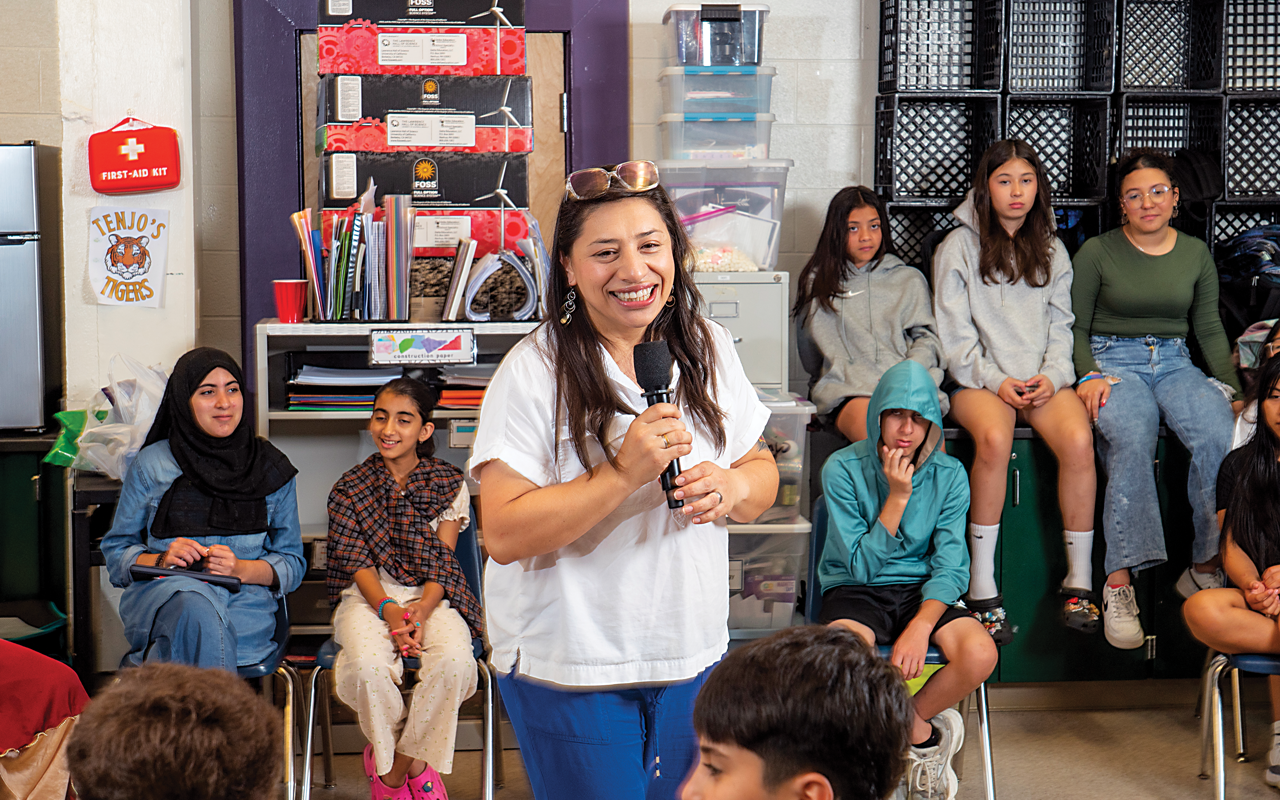
Lina Tenjo Tipton
English Learner Teacher
Gunston Middle School
Years Teaching: 11
A native of Colombia, Tenjo Tipton was named Teacher of the Year at both Escuela Key Elementary in 2018 and Gunston Middle School this past academic year.
- When I was little, my three sisters and I played like my sisters were the teachers and the rest of us were the students. We set up a little school in our house, where we invited neighbors. I think that sparked a lot of curiosity in my life about service and how you can help other people.
- My “why” are my students. We sometimes spend more time together than they spend with their parents. I know they are in a vulnerable situation because they do need to learn the English language. They need that safe space to learn in the classroom. Most of the time, I think I learn more from my students than they probably learn from me.
- Ours is a multicultural classroom. I’ll teach one topic—for example, energy or electricity—and we talk about that from all perspectives, from different countries. How do you use energy in your house? We come up with real experiences in the classroom. I don’t mind bringing things from home. I have a kitchen in the school—a little oven, a blender. You cannot learn the vocabulary unless you have the hands-on experience to make the connections. I’m here to guide, to facilitate the learning.
- My advice to future educators? Be present. If the kids are participating in a show, make the time to go to that show. If they tell me, “Miss Lina, I’m going to play a soccer game,” try to make the time or ask them, “Hey, how was your soccer game?” Don’t forget about the simple things that are important to the kids.
- I’m an English language learner myself, and I struggle. It’s hard to be in a society where you can be judged because of your accent, or because people don’t understand you, or because you don’t fit—because of so many things. I’m trying to be the best version of myself and give my students hope that, yes, you’re going to be okay. I tell them: I still make mistakes. We’re human, and if we make a mistake, tomorrow we will just figure it out and do it better. —Interview by Eliza Tebo
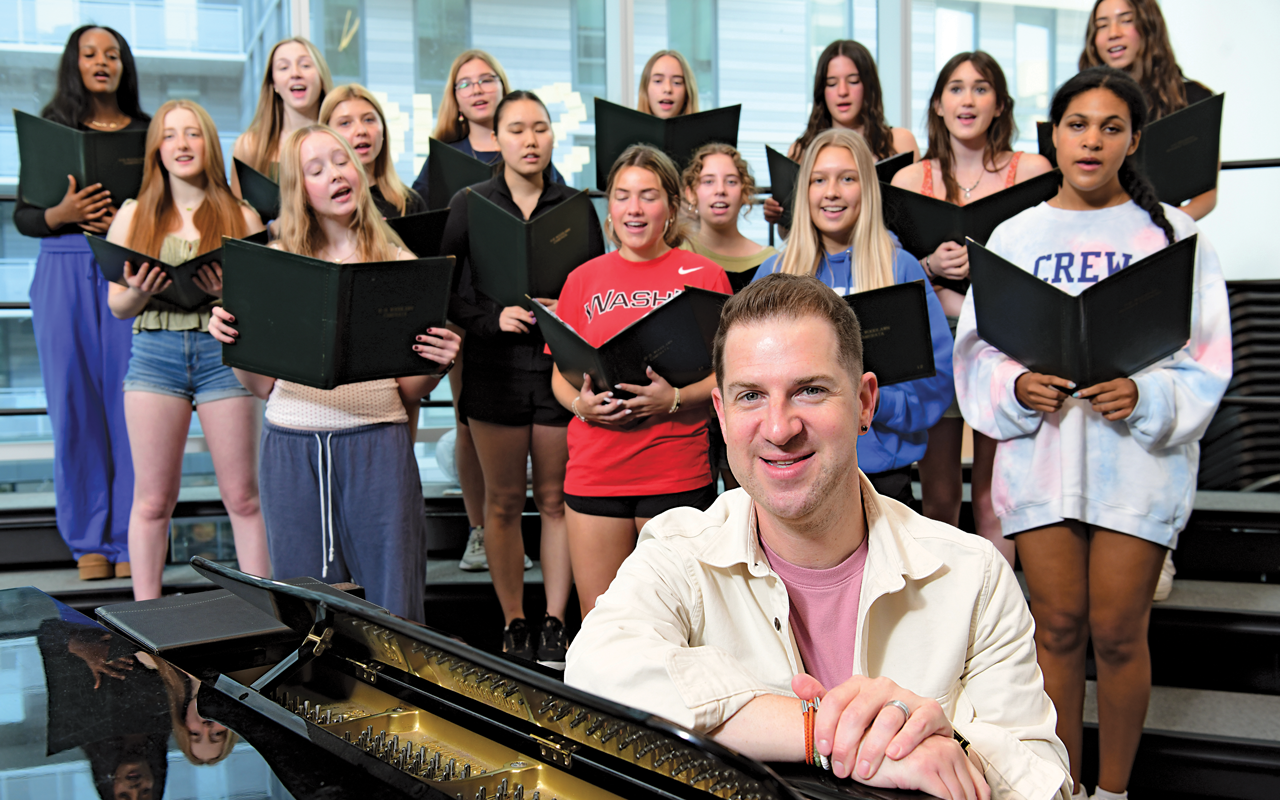
Bill Podolski
Choral Director
H-B Woodlawn Secondary Program
Years Teaching: 20
A quarterfinalist for the 2026 Grammy Music Educator Award, Podolski has served as choral director at H-B Woodlawn for 17 years, where he leads multiple choirs, teaches general music and co-directs musicals.
- When I was in elementary school, a music teacher sought me out. I was this lonely kid on the playground, and that teacher invited me to join the band. That started my time in school music groups. I found my way into chorus. Throughout middle and high school that became my place of belonging, where I felt like I was talented and capable.
- I knew from a very young age I wanted to be a teacher. I wanted to pay forward the gift of what a music ensemble can be. I went to George Mason University to get my music education degree, and the rest is history.
- I have a phrase that I use all the time in my class: “Excellence is a habit that is practiced.” Every day we’re trying to instill performance practices so that when the nerves take over, students can still shine, they can still thrive.
- Students who have not been successful in other classes often find their way to my classroom. I think they sense that I believe in them. They may, in turn, have great success in a way they’re not enjoying in other places.
- I’m all about community building. In order for us to sing together, we need to trust and have some sense of community. I also know that to discover our voice and do something that is so vulnerable (so many Americans feel like they can’t sing) we need to discover our ability. Often that’s through play. We have a parachute, balls, bean bags. We play first and then discover our voice through that.
- What would I tell a prospective teacher? Teaching is a noble career. We need teachers. And I would say it’s hard. It’s not society’s chosen career; we see that in the pay scales. But there is so much glory in other ways—students you’ve influenced and families who appreciate that you’ve made an impact on their kid. So, I would be a big encourager. Come join the fold. —Interview by Eliza Tebo
